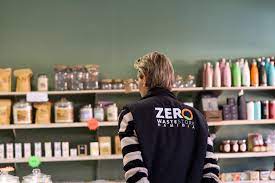The 9th National Ceramics Biennale stuns at the National Art Gallery of Namibia
September 17, 2019
Duwisib: Von Wolf and His Castle in the Desert
September 30, 2019In a true first for Namibia, a zero waste store has finally opened up in the capital city. On 1 July, Brigitte Reissner opened the doors of the Zero Waste Store Namibia in Windhoek.
About the need to open Zero Waste Store, Brigitte mentions being inspired by the waste-free lifestyle but unable to find shops to accommodate her in Namibia. At the Zero Waste Store, pasta, rice, cereals, flour, vinegar, tea, coffee and much more is available in bulk so that consumers can take what they need and put it in their own container.
The need to go waste-free has been exemplified in recent years as more and more people become aware of the effect consumer habits have on the environment at large. The waste we produce is meant to be contained in garbage dumps and landfills but often end up in nature. In some cases, ecosystems are damaged irrevocably by careless waste management. Pristine landscapes continue to draw visitors and generate income through tourism in Namibia. Unfortunately, in countries where waste management is not prioritised, natural resources suffer the consequences.
The move towards waste-free living is largely driven by the renewed awareness of packaging and the consequences of unnecessary plastic or inorganic materials that accompany our everyday purchases. The vegetable baggies at grocery stores, straws in our drinks, endless foam pellets. While most consumers are aware of the need to recycle and are at least able and to some degree doing so, microplastics can still end up in the natural environment. The biggest issue, according to Brigitte, is the fact that plastic can never be broken down and stays in the environment forever.
The pillars of living as eco-friendly as possible remains to reduce, reuse and recycle. By becoming a conscious consumer, one rethinks whether a purchase is necessary, and when it is, that which has not been consumed or composted is reused as many times as possible before being recycled. Where packaging is not recyclable, or the local recycling plant does not have the capabilities to recycle a specific material. In such cases, trying to forgo packaging completely is the best alternative. Always check plastic containers for the recycle sign to be sure that it can be recycled.

The Zero Waste Store Namibia: Corner of Sam Nujoma and Stein Street in Klein Windhoek; 081 127 8851.
Follow them on instagram @zerowastestorenamibia

